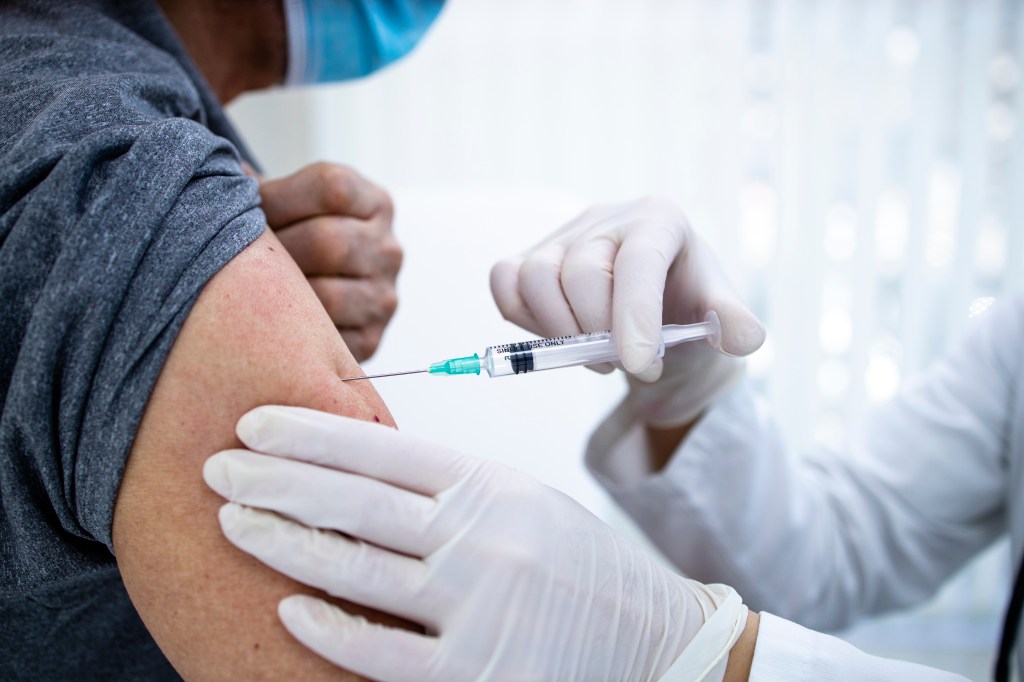Most people know that exercising, eating healthy and keeping an active mind can reduce your risk of dementia.
But with the expected number of American lifestyle with the dementia predicted to increase to 13.8 million by 2060, hunting is on for anything that can help prevent this devastating disease.
Now, a new study by Stanford Medicine has presented some of the strongest evidence that a vaccine that can help prevent dementia already exists – besides being a completely different condition.

The researchers analyzed the health data of over 280,000 seniors in Wales and found that those who received the Shegles vaccine were 20% less likely to develop dementia over the next seven years compared to those not.
“It was a truly wonderful finding,” said Pascal Geldsetzer, a stanford medical assistant professor. “This great protective signal was there, any way you viewed the data.”
Shegles is a painful rash condition caused by reactivation of the varicella-zoster virus which remains sleeping in nerve cells as someone has oil.
While the exact cause of the bond between herpes vaccine and dementia is unknown, some believe that preventing this reactivation can reduce neuroinflammation, a factor implicated in the development of dementia.
The study is unique in a major way. Previous research has shown a link between herpes vaccine and dementia – for example, a 2024 study by the University of Oxford found that the newest recombinant herpes vaccine, Shingrix, was associated with a 17% reduction in the risk of its predecessor, Zostavax.
However, the research has not been able to calculate the impact that lifestyle factors can have on the results.
“All of these accompanying studies suffer from the basic problem that people being vaccinated have different health behaviors than those who do not,” Geldsetzer said.
“In general, they are seen to be not enough evidence enough to make recommendations.”

In particular, this study capitalized in a unique public health policy at Wales, in which people who had turned 80 shortly after September 1, 2013 were acceptable to the Shingles vaccine – while those who returned 80 a little earlier were unacceptable.
This natural division allowed researchers to compare the rates of dementia between the two very similar groups.
“We know that if you get a thousand people randomly born within a week and a thousand people randomly born a week later, there should be nothing different about them on average,” Geldsetzer said. “They are similar to each other in addition to this little change in age.”
“What makes the study so powerful is that it is essentially as a random judgment with a control set – they are a little older to be acceptable for the vaccine – and a set of interference – they just young people are right,” he added.
Even when calculating other factors – such as education levels and vaccination history – the team found both groups to be practically indistinguishable except for the decline of madness cases in the herpe vaccine group.
“Due to the unique way in which the vaccine revolved, the prejudice in the analysis is much less likely than it would be usually,” Geldsetzer said. “The signal in our data was so strong, so clear and so persistent.”
As with the Oxford study, this new study found that the vaccine protective benefits were higher in women than men – perhaps because women are more prone to herpes.
The Stanford team has repeated the study in several other countries over the past two years with similar results.
Now they hope to start a big, case -controlled judgment to strengthen the evidence.
“It would be a very simple, pragmatic judgment, because we have a single interference that we know is safe,” Geldsetzer said.
Can other jabs dementia fight?
Enough quite interesting, this is not the only vaccine that has been shown to reduce the risk of dementia. Uthealth Houston found in 2023 that vaccination against tetanus and diphtheria were also related to AA reduced the risk for Alzheimer’s.
A year ago, the same research team published another study that found that receiving at least one flu vaccine made people 40% less likely to develop Alzheimer’s disease that never received a flu block.
“We and others hypothesize that the immune system is responsible for causing alzheimer’s brain cell dysfunction,” said Paul E. Schulz, MD, senior author.
“The findings suggest that vaccination has a more overall effect on the immune system that is reducing the risk of developing Alzheimer’s.”
#vaccine #reduced #risk #elderly #dementia
Image Source : nypost.com